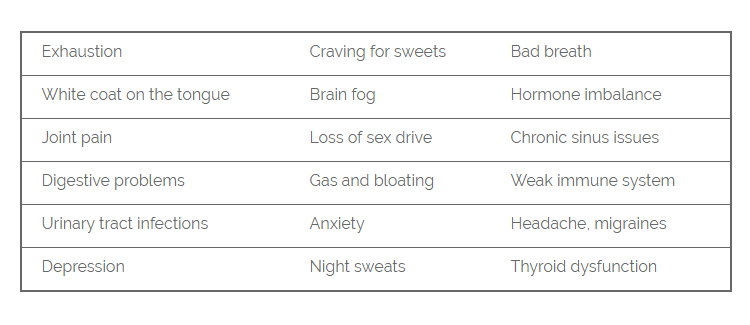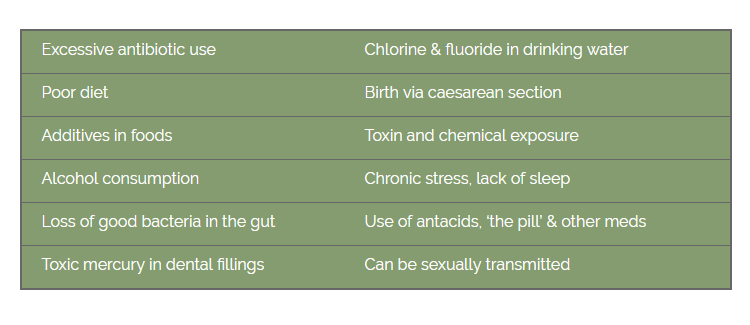Candida definition
Candida is a genus of yeast that is the most common cause of fungal infections worldwide. (1, 2)
Candida is typically found in small amounts in the mouth, intestines and on the skin. At normal levels, the fungus is not problematic. However, when Candida begins to grow uncontrollably, it can cause systemic infections of the bloodstream or major organs, known as candidiasis.
Typically, the healthy bacteria in your body can keep Candida levels under control. However, if healthy bacteria levels are disrupted or the immune system is compromised, Candida can begin to proliferate and get out of control.
The most common symptoms associated with Candida overgrowth include:

Candida – Is it a legitimate diagnosis?
Diagnosis and over-diagnosis
You certainly need to be cautious, as some alternative medicine practitioners blame Candida for everything and suggest that you don’t even need advanced lab testing to diagnose candida infection or a problem. They rely entirely on a list of symptoms.
Tried the Candida spit test? Unfortunately, the spit test may not be very reliable. The test has a high rate of false negatives and false positives. It should not be used as the only means of determining a diagnosis of Candida.
Unfortunately, the label of candida is thrown on just about any collection of signs and symptoms that haven’t yet been properly diagnosed.
As you explore the list of symptoms mentioned above, you may be thinking, ‘Hey, that sounds like me. I must have candida.’
But the challenge is that these symptoms are extremely nonspecific, and therefore, they cannot be attributed to just a single problem such as candida. There are at least 10 other different possible diagnoses that could cause all of these symptoms listed above.
Having candida in your gut is not necessarily a problem. Once again, Candida is a normal (yes, normal) resident of the digestive tract, a fact that eludes a lot of people in the alternative medicine world. So, candida itself is not necessarily a problem.
It’s also true that Candida infection is over-diagnosed, especially when no lab testing is used to come to this diagnosis.
The Risk of Over-Diagnosis
The issue here is that slapping a diagnosis of candida onto a list of symptoms, without proper lab testing to back it up, might mean that another diagnosis (the real one) is missed.
For example, if you or your practitioner are convinced you have candida, then you may not seek proper testing (diagnosis) and treatment for conditions such as SIBO, a parasitic infection, or even more seriously, something like inflammatory bowel disease, ulcerative colitis, or Crohn’s disease. All of which require a different treatment approach than candida overgrowth.
Without proper lab testing, you’re guessing!
Getting the correct diagnosis is the starting place for an effective treatment. And that could be the difference between struggling with symptoms or leading a normal, healthy life.
That doesn’t mean that candida overgrowth, or invasive candidiasis, isn’t a possible diagnosis. The gut flora is an ecosystem. Like all ecosystems, the gut flora can get thrown out of balance. There are many aspects of the modern lifestyle that can create a more ‘hospitable’ environment for yeast to proliferate. These include (3, 4, 5, 6, 7, 8)

If you would like to explore this concept further, have a read of these Effortless Superhuman blog articles.
Basic Gut Physiology – Part 2 – What can go wrong
Basic Gut Physiology – Part 3 – The Gut Microbiome
The research is in the preliminary stages, but the evidence does suggest that even normal intestinal yeast can become problematic in certain situations.
Testing for Fungal Overgrowth
One of the challenges practitioners face is that, because the conventional medicine paradigm has denied the diagnosis of Candida for so long, there are very few strong studies to guide treatment protocols, and the testing is extremely limited.
The two most promising forms of testing at present include:
- Advanced stool testing done by specialty labs – which can diagnose
fungal overgrowth in the stool. - Urine organic acid markers such as D-arabinitol – which can detect fungal overgrowth. This test is used in some hospital settings as a marker for invasive candidiasis, so there is peer-reviewed research behind this form of testing.
Although there is no perfect test available for diagnosing fungal overgrowth, a skilled functional medicine practitioner can use all of the available evidence to support a diagnosis of Candida – not just symptoms but also physical signs, stool samples, and D-arabinitol.
Candida typically responds very quickly to treatment, and failure of a client to respond to treatment can provide significant information to the treating practitioner, suggesting that an alternative diagnosis may need to be considered.
Treating Fungal Overgrowth
The question then becomes, “What is the most effective form of treatment if you do have fungal overgrowth on one of these stool tests?”
Diet
The diet that our practitioners have found most effective in practice is a low-carb Paleo or even ketogenic diet.
Antifungal botanicals
There are a lot of herbs and nutrients that are antifungal. These include:
- Undecylenic acid, which is an organic type of fatty acid
- Lauric acid, which is found in coconut products, and also monolaurin in products like Lauricidin
- Caprylic acid
- Uva ursi
- Cat’s claw
- Pau d’arco
- Spice oils like thyme and oregano. Note: these oils are extremely potent and should be used with caution and preferably under the supervision of a practitioner
- Coptis
- Oregon grape
- Chinese skullcap
- Berberine
This list likely represents the most tested botanical remedies. Some are also antibacterial and anti-parasitic, which may be doubly helpful.
The best part about these botanicals is that don’t impact the gut flora the same way as prescription antibiotics or (drug) antifungals. And they have far fewer side effects and risks. But don’t underestimate these botanicals, they can still be quite potent, especially when used over the longer term, and may actually deplete the gut flora. So, it’s best to work with a functional medicine practitioner when using them.
Biofilm Disruptors
Yeast can form what is known as a ‘biofilm’, which is an extracellular matrix that they can live in. This film makes it harder for the immune system and for any external antifungals you might take to be effective. So, disrupting the biofilm can be very helpful.
- N-acetylcysteine
- Nattokinase
- Specific products like ‘Biofilm Defense’
Probiotics
- Soil-based organisms like Primal Probiotic
- Transient commensals like MegaSporeBiotic
- Beneficial yeast Saccharomyces boulardii
- Prebiotics to support the growth of beneficial bacteria
- Prescription Antifungals
Far too often, prescription antifungals are used liberally and freely to treat Candida. Some antifungals like Sporanox have pretty severe side effects, with possible side effects all the way up to liver damage and death. It’s essential to have your liver function monitored while using these drugs.
Other drugs like nystatin are typically much better tolerated. These drugs certainly shouldn’t be the first step in any Candida treatment protocol.
In Summary
- Proper testing and diagnosis are key factors
- Working with a Holistic Healing Practitioner is essential.
The most prudent approach might be to follow a low-carb Paleo diet, choose some fatty acids like undecylenic acid or lauric acid, choose one or two of the antifungal botanicals listed above, and a biofilm disruptor and then monitor carefully how that goes.
But again, it’s always better to do it under the supervision of highly-skilled practitioner.
If you would like some help, give us a call today on 9388 2768.
Results may vary.
